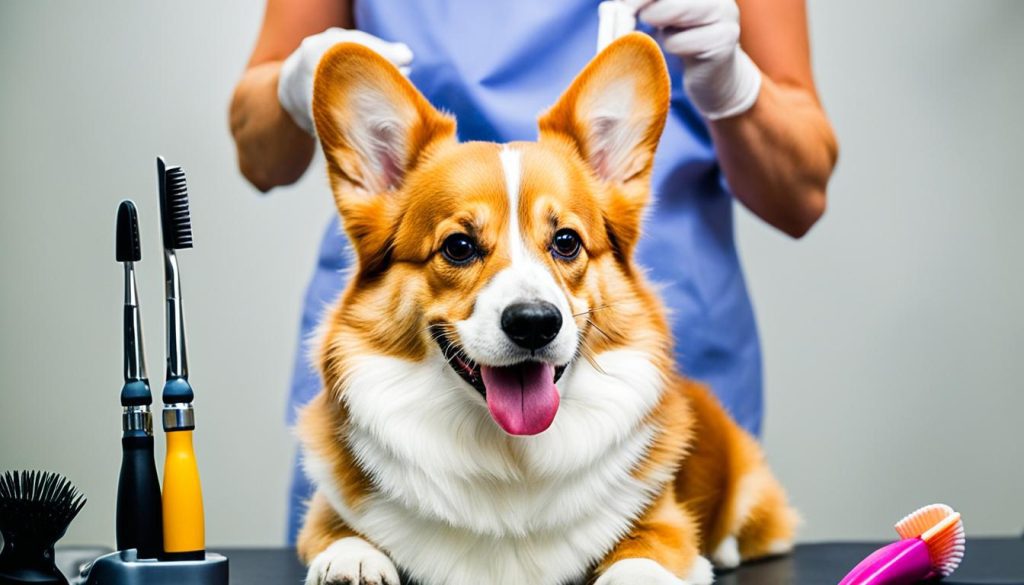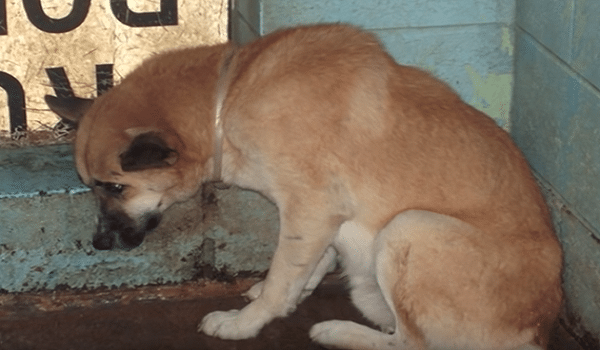Pembroke Welsh Corgis are intelligent and highly active dogs. They have a high level of cognitive abilities and are considered one of the smartest dog breeds. Originally bred for herding, Corgis still possess strong herding instincts. Their intelligence, combined with their friendly and devoted temperament, makes them popular pets.
Queen Elizabeth II is known for her love of Pembroke Welsh Corgis, further showcasing their appeal. These dogs are not only smart but also make excellent companions for individuals and families alike. Their intelligence allows them to quickly learn and adapt to various situations.
Are Pembroke Welsh Corgis Smart?
- Pembroke Welsh Corgis are considered one of the smartest dog breeds.
- They have a high level of cognitive abilities and are quick learners.
- Corgis were originally bred for herding and still possess strong herding instincts.
- Their friendly and devoted temperament makes them great companions.
- Queen Elizabeth II’s fondness for Pembroke Welsh Corgis has contributed to their popularity.
Corgi Breed History
The Pembroke Welsh Corgi breed has a rich history that dates back to the 10th century. It is believed to have originated in Wales, where it was brought by Flemish weavers. An alternate theory suggests that these charming dogs may have descended from the Swedish Vallhund.
Originally, Corgis were primarily used for herding and guarding livestock. Their low stature and nimble agility made them well-suited for herding cattle and sheep. In addition to their working abilities, they also served as loyal companions to their owners.
Over the years, Corgis gained popularity and recognition as a distinct breed. They became beloved pets of various individuals, including the British monarchy. Queen Elizabeth II, known for her fondness for Corgis, played a significant role in promoting the breed.
Today, the Pembroke Welsh Corgi breed is recognized by notable organizations such as the American Kennel Club (AKC) and the English Kennel Club. They have become cherished companions and continue to captivate the hearts of dog lovers worldwide.
Corgi Breed History
| Year | Event |
|---|---|
| 10th century | The Pembroke Welsh Corgi breed is believed to have been brought to Wales. |
| 18th century | Corgis gained popularity as excellent herding dogs. |
| 20th century | Recognition by kennel clubs solidified the breed’s status. |
| Present day | Corgis are cherished companions worldwide. |
Corgi Characteristics
Pembroke Welsh Corgis possess unique and defining characteristics that make them easily recognizable. From their physical appearance to their temperament, Corgis have a charm all their own.
Physical Appearance
Corgis have a distinct foxy face with expressive eyes that beautifully reflect their intelligence. Their prick ears stand tall, always attuned to their surroundings. One notable feature of Corgis is their closely docked tail, which adds to their overall appeal. Additionally, Corgis are achondroplastic, a dwarf breed with adorably shortened legs that only adds to their charm.
Here is an example of a Corgi:

Temperament and Personality
Known for their friendly and outgoing nature, Corgis are devoted companions. They have a natural inclination to build strong bonds with their families and are well-loved for their affectionate nature. Corgis are fun-loving and enjoy being the center of attention. Their high level of intelligence makes them quick learners, and their herding instincts are deeply ingrained in their character.
Size
Corgis are a small to medium-sized breed. According to the American Kennel Club (AKC), the ideal weight for adult Corgis is around 25 to 30 pounds for males and 24 to 28 pounds for females. Their compact size makes them suitable for various living situations, including apartments and houses with limited space.
| Characteristic | Description |
|---|---|
| Physical Appearance | Foxy face, prick ears, closely docked tail, achondroplastic (dwarf breed with shortened legs) |
| Temperament | Friendly, devoted, fun-loving, highly intelligent, herding instincts |
| Size | Small to medium-sized breed; around 25-30 pounds for males, 24-28 pounds for females |
| Coat | Short, weatherproof double coat with various colors |
Average Lifespan of Corgis
When considering adding a beloved Pembroke Welsh Corgi to your family, it’s important to understand their average lifespan and life expectancy. The average lifespan of a Pembroke Welsh Corgi is 12 to 13 years, which is relatively long compared to other dog breeds. However, it’s essential to note that individual Corgis may live shorter or longer lives depending on various factors.
Interestingly, females tend to live slightly longer than males. While genetics play a role in determining the overall lifespan, factors such as nutrition, exercise, and healthcare can significantly impact a Corgi’s life expectancy.
The main causes of death in the Corgi breed are cancer and old age. By providing your Corgi with regular veterinary check-ups and maintaining a healthy diet, you can help prevent or detect potential health issues early, thus increasing their chances of living a longer and healthier life.
With proper care and attention, Corgis can live beyond the average lifespan. By offering them a loving home, balanced nutrition, regular exercise, mental stimulation, and quality healthcare, you can maximize the chances of your Corgi enjoying a happy and fulfilling life for many years.
Diet and Health Maintenance
Proper nutrition plays a vital role in promoting a Corgi’s overall health and longevity. Consult with your veterinarian to develop a nutrition plan specific to your Corgi’s needs, taking into consideration their age, weight, and any existing health conditions. A well-balanced diet should consist of high-quality dog food that provides essential nutrients to support their immune system, joint health, and overall well-being.
In addition to a healthy diet, regular exercise is crucial for a Corgi’s physical and mental well-being. Tailor the exercise routine to your Corgi’s energy levels and age. Daily walks, interactive play sessions, and mentally stimulating activities can keep your furry friend happy, active, and in good shape.
Preventive healthcare measures such as vaccinations, parasite prevention, dental care, and routine check-ups are essential to safeguard your Corgi’s health and catch any potential issues early. Regular health monitoring allows your veterinarian to monitor your Corgi’s well-being, detect any concerns, and provide appropriate treatment.
| Factors | Impact on Lifespan |
|---|---|
| Proper nutrition | ✓ |
| Regular exercise | ✓ |
| Quality healthcare | ✓ |
| Early detection and treatment of health issues | ✓ |
| Preventive measures (vaccinations, parasite prevention, dental care) | ✓ |
Remember, every Corgi is unique, and their lifespan can vary based on individual factors. By offering your furry friend a loving and caring environment, a nutritious diet, regular exercise, and excellent healthcare, you can help ensure they live a long, happy, and healthy life.
Corgi Care Tips
As highly intelligent and energetic dogs, Corgis require specific care to ensure their well-being. From training and exercise to diet and grooming, here are some essential tips for taking care of your Corgi:
Training:
Corgis are responsive to positive reinforcement training methods, making it important to provide them with consistent guidance and reward-based training. This helps them learn commands and good behavior, making them well-behaved companions.
Exercise:
Corgis have a high energy level and require regular exercise to keep them physically and mentally stimulated. Daily walks, playtime activities, and mental challenges are necessary to maintain their overall health and happiness.
Diet:
Feeding your Corgi a balanced and nutritious diet is crucial to maintain their health and prevent weight-related issues. Consult with your veterinarian to determine the appropriate portion sizes and choose high-quality dog food that meets their nutritional requirements.
Grooming:
Corgis have a medium-length double coat that requires regular brushing to prevent matting and keep their fur healthy. They shed moderately, so frequent brushing helps manage their shedding. Additionally, nail trimming and dental care should be part of their grooming routine.
Here is a table summarizing the key care requirements for Corgis:
| Care Requirement | Description |
|---|---|
| Training | Consistent and positive reinforcement training methods |
| Exercise | Daily walks, playtime, and mental stimulation |
| Diet | High-quality balanced food, portion control |
| Grooming | Regular brushing, nail trimming, dental care |
Giving your Corgi proper training, exercise, a balanced diet, and regular grooming will ensure their overall well-being and help them thrive as intelligent and active companions.

Living with a Corgi
Living with a Corgi can be a delightful experience, as these adaptable dogs can easily fit into various types of homes. Whether you live in a spacious house or a cozy apartment, Corgis can thrive as long as they receive ample exercise and mental stimulation.
Corgis are social dogs that crave companionship and enjoy being part of the family. They form strong bonds with their owners and are known for their friendly and affectionate nature. Proper socialization from a young age is important to ensure that they get along well with children and other pets in the household.
It’s essential to provide Corgis with sufficient mental and physical stimulation to prevent boredom and undesirable behaviors. Regular exercise, such as daily walks or playtime in a safely fenced yard, is crucial to their overall well-being. Engaging them in interactive games and challenging puzzles can also help keep their minds sharp.
Corgi Living Conditions
| Living Conditions | Suitable | Not Suitable |
|---|---|---|
| Apartments | As long as they have regular exercise and mental stimulation | Without sufficient exercise and mental stimulation |
| Houses with yards | Great, especially with access to a safely fenced yard | If left alone for long periods without exercise and attention |
Providing a comfortable and safe living environment for your Corgi is important. Be sure to create a designated space for them with a cozy bed, toys, and access to fresh water. Secure any potential hazards in your home and consider crate training to provide them with a safe haven when necessary.
Overall, with the right living conditions, socialization, and care, Corgis can bring immense joy to your life and make wonderful companions for individuals and families alike.
Common Corgi Health Problems
While Pembroke Welsh Corgis are generally healthy dogs, like any breed, they are prone to certain health issues. It’s important for Corgi owners to be aware of these common health problems and take appropriate measures to prevent or manage them.
1. Degenerative Myelopathy
Degenerative myelopathy is a progressive neurological disease that affects the spinal cord of Corgis. It typically starts with hind limb weakness and can eventually lead to paralysis. While there is no cure for degenerative myelopathy, early detection and management can help slow down the progression of the disease.
2. Hip Dysplasia
Hip dysplasia is a common orthopedic condition in Corgis. It occurs when the hip joint doesn’t develop properly, resulting in poor joint alignment. This can cause pain, lameness, and arthritis. Regular exercise, maintaining a healthy weight, and avoiding activities that put strain on the hips can help manage hip dysplasia in Corgis.
3. Progressive Retinal Atrophy
Progressive retinal atrophy (PRA) is a group of inherited eye disorders that cause progressive degeneration of the retina, leading to vision loss and eventual blindness. PRA is a genetic disease that can be screened for through DNA testing. While there is no cure for PRA, regular eye examinations can help manage the condition and provide early intervention if necessary.
4. Von Willebrand Disease
Von Willebrand disease is a bleeding disorder caused by a deficiency of a blood clotting protein called von Willebrand factor. It can result in prolonged bleeding after injury or surgery. Corgis with von Willebrand disease should avoid certain medications and undergo appropriate management during surgical procedures.
5. Patent Ductus Arteriosus
Patent ductus arteriosus (PDA) is a congenital heart defect where a blood vessel called the ductus arteriosus, which is supposed to close shortly after birth, remains open. This can lead to heart failure if left untreated. Surgical intervention is often required to correct PDA in Corgis.
Regular veterinary check-ups, a balanced diet, exercise, and maintaining a healthy weight are essential for preventing or managing these common health problems in Corgis. It’s also important to research and select a reputable breeder who conducts health screenings to reduce the risk of inheriting genetic diseases.
Common Corgi Health Problems and Management
| Health Problem | Description | Management |
|---|---|---|
| Degenerative Myelopathy | Progressive neurological disease affecting the spinal cord | Early detection, physical therapy, assistive devices |
| Hip Dysplasia | Malformation of the hip joint | Regular exercise, weight management, joint supplements |
| Progressive Retinal Atrophy | Progressive degeneration of the retina | Regular eye examinations, supportive care |
| Von Willebrand Disease | Bleeding disorder | Avoid certain medications, management during surgery |
| Patent Ductus Arteriosus | Abnormal heart condition | Surgical intervention |
Regular veterinary care and a proactive approach to your Corgi’s health can give them the best chance for a long and happy life. By being mindful of the common health problems in Corgis and taking proactive measures, you can ensure your furry friend stays healthy and happy by your side.
Conclusion
Pembroke Welsh Corgis are undeniably intelligent dogs with a high level of cognitive abilities. Their herding instincts, along with their friendly temperament and unwavering devotion to their families, make them truly exceptional companions.
However, to bring out the best in these smart and energetic dogs, proper training, socialization, and care are essential. Corgis thrive in an environment where their intelligence is challenged and their need for mental stimulation is met.
If you appreciate intelligence and a unique personality, the Pembroke Welsh Corgi may be the perfect fit for you. With the right environment, care, and understanding, Corgis can make wonderful friends and lifelong companions.






